The world of SEO is full of misconceptions and myths. Anyone can claim they’re a search expert and publish any theory, and then call it the latest, greatest search (or SEO) technique. Chasing these wild ideas can be a major waste of time, or worse, harmful to your business.
On August 8, 2019, Eric Enge (General Manager, Perficient Digital) and Rand Fishkin (Founder, SparkToro) presented a webinar, Eric Enge and Rand Fishkin Debunk the Biggest Myths in Search. They used data along with their own experience to debunk today’s top search myths. Here are just a few:
- You can’t get value from no-click searches
- Featured snippets cost you traffic
- Using schema always increases traffic
- Paid search is bigger than organic
Find out how Eric and Rand debunk these common misconceptions by checking out the webinar below or reading the transcript.
Original live webinar aired on Thursday, August 8, 2019 at 1:00 PM ET
Transcript
Eric: Hello everybody. My name is Eric Enge. I’m a General Manager at Perficient Digital in the digital marketing team. With me is my longtime friend Rand Fishkin. I think you probably all know him, but he was the founder of Moz, now founder of SparkToro, and author of the book ”Lost and Founder.” Forgive me for putting it this way, Rand, but he’s also a general industry legend. Thanks for joining us today.
Rand: It’s my pleasure, Eric. I’m very excited to bust some SEO myths with you.
Eric: Yeah, this should be fun. What we’re going to do is run through nine popular myths. We’re going to go pretty quickly because we have a lot of data to share in a short amount of time. Hopefully, you’ll get a ton of value out of this.
Rand: And we want some Q&A time at the end.
Eric: Yes, we do. And if you want to tweet stuff, we suggest you use the #SEOMythBusters.
Rand: #SEOMythbusters.
Eric: You’ve got it. I’ve always wanted to be a ghostbuster, mythbuster or something like that. Are we ready to get rolling?
Rand: Let’s roll.
Eric: Excellent. So let’s start with our first myth – you can’t get value from no-click searches. Another related myth is that traffic that goes to Google properties is of no use to you. So, what’s the reality?
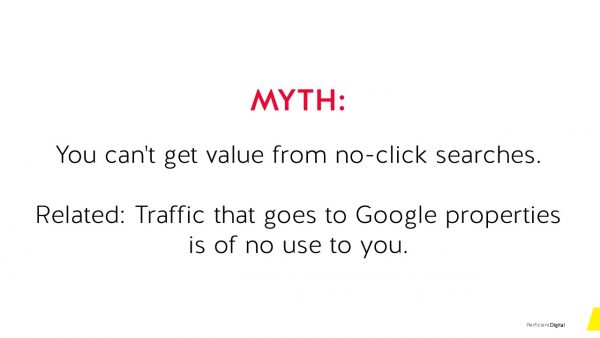
Rand: The reality is a bit complicated, and frustrating.
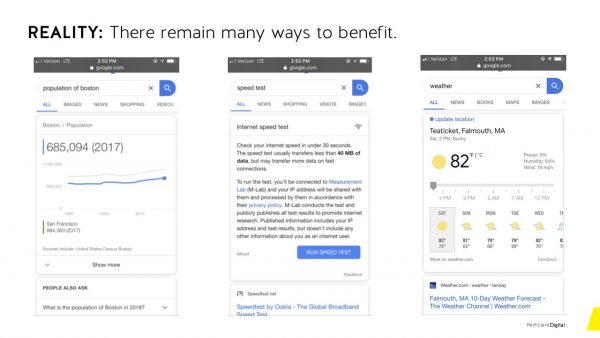
Eric, let’s look at a search on the population of Boston or the weather. It’s absolutely the case that folks like wunderground.com, weather.com, and citylab.com in the case of the population query, have lost a lot of traffic on these head of the demand curve terms. However, I think the reality is that when this happens, many of these searches and many of the searchers are not the most lucrative or engaged ones. They’re looking for quick, instant answers. Because of that, there’s not a tremendous amount of value that can be extracted from them. Google tends to take away a lot of the traffic that is of the least value to a website.
And so I think some of these concerns have been overblown. I also wanted to specifically mention the speed test one. This is an excellent example because at Ookla, which runs speedtest.net, you can see that the bottom result there, the second one on the mobile, has continued to benefit massively from this ranking despite the fact that Google has its own speed test. I think that’s because people trust the speed tests from Ookla more. On many search queries related to speed test, Ookla comes up, but the Google OneBox answer doesn’t. To your point, if Google is sending traffic to its other properties, whether it’s Google Books or shopping, Google Images or maps or YouTube, you can still benefit from being in those rankings and controlling the information that’s seen through Google.
Eric: Yes. And for YouTube in particular, it’s a very large search engine in its own right. You can see that a significant number of YouTube results show up in organic search results. So it’s actually another way to get back into Google if you have a very effective video strategy within YouTube.
Rand: Absolutely right.
Eric: Our next myth is that featured snippets cost you useful traffic.
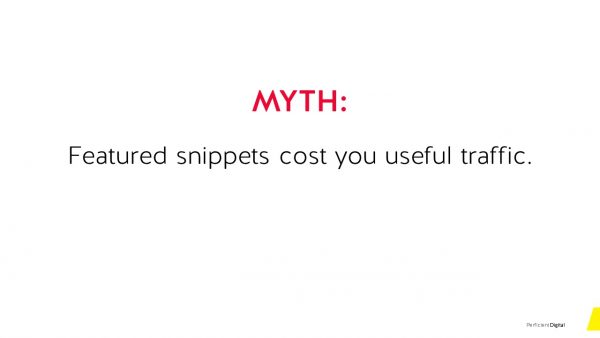
In the data point from one site we looked at in detail where they got a featured snippet, it was pretty apparent on what day that happened.
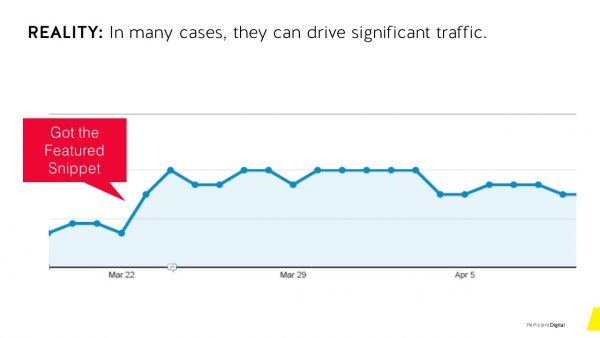
Traffic really took off for them in a very big way on this particular page. It’s just one page, but traffic more than doubled. We’ve seen this kind of data in many, many different scenarios. This is just one example, which isn’t to say that there aren’t situations where featured snippets do cause you traffic. I think there are, I just happen to think that they occur more where it’s a benefit similar to your Ookla example.
Rand: Yes. I think about it like there’s a flow chart in my head that asks, would I rather have the featured snippet than my competitor? If that’s the case, I want to pursue it even if it costs me traffic because I want to own and control the information that people find when they come to Google. I worry that some SEOs are biased against it because they don’t want to cost themselves traffic as opposed to thinking about the bigger picture, which is that this is a competitive landscape. You don’t have a ton of options here. Either you’re going to get it or someone else is, and I’d rather it be you. When I was at Moz, we had this with searches like meta-description and title tag length. Moz would get the feature description, and we were shocked to see that the title tag length actually increased our traffic even though the number was right in there.
Eric: That’s interesting. And like you said, it actually cost you traffic, which was probably low-value traffic anyway.
Rand: Exactly.
Eric: All right, on to our next myth. This one is that using schema always increases your traffic.
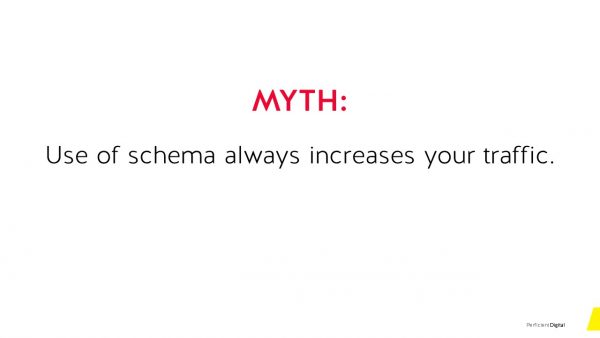
What’s the reality?
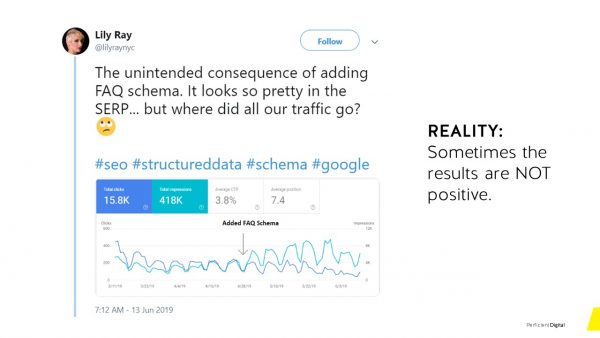
Rand: So I think this is sort of a rock and a hard place scenario, almost a prisoner’s dilemma for a lot of marketers deciding whether they want to mark up their data in a way that Google can easily access it, crawl it, and then display it in search results in these formatted types of waves. Lily Ray pointed out an excellent example of this, which I cited at MozCon last month. Where we added the FAQ schema, we got a ton more impressions. You can see impression count almost doubling because Google is showing so much more information. They’re ranking higher, and appearing higher in the results. Traffic, however, is tanking for the keyword because people are getting the answer. They’re not clicking through because they don’t need to.
Lily Ray, who’s an expert on SEO, also pointed out that this is only one example. Schema does not always create a loss. Sometimes these schema drive more traffic, not just more impressions. This is an instance of where it isn’t always a competitive landscape, because some data may be exclusively yours. You need to decide if you want to mark that up for Google if it’s your proprietary data or keep that in reserve? This is a tough decision.
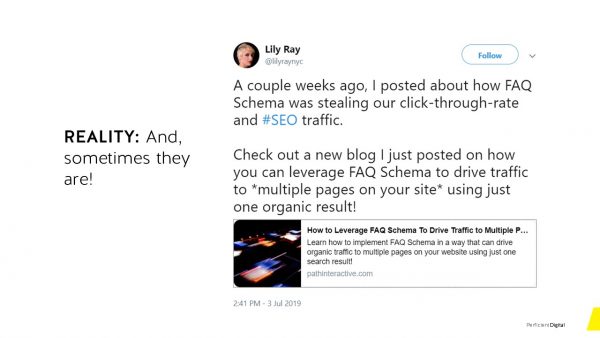
Eric: Yes, indeed. But in aggregate, there’s a lot of benefit to be gained from schema, as Lily suggested in her tweet and her article on this topic. It’s a really good idea to actually measure and see what happens, and then make an informed decision about what you want to do.
Rand: I totally agree. The SEO world is full of cases where you have to test. That’s just one.
Eric: All right, let’s move on to our next myth.
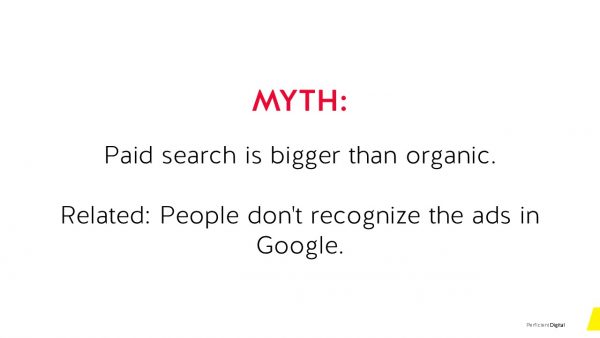
I run into a lot of people who think that paid search is bigger than organic. And then I run into people who think that people just don’t recognize the ads in Google. They’re being fooled.
The reality is that today we still see an 11 to 1 disparity in favor of organic traffic over paid traffic. This is excellent data that you pulled together from SparkToro, Rand.
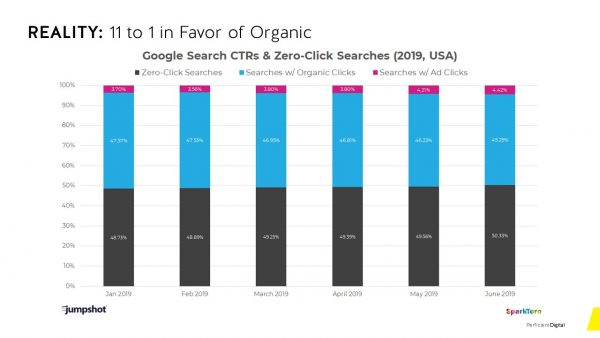
Rand: This would be JumpShot.
Eric: Yes, Jumpshot is an excellent clickstream monitoring service. I think it’s 100 billion clicks you looked at, or something like that.
Rand: About 11 billion devices in the U.S.
Eric: That’s a very statistically significant example. Just three years ago, I believe it was 26 to 1 in favor of organic. Google has definitely morphed and grown its page share, but organic still makes up the lion’s share.
Rand: Yes. And I think an interesting point about what you were saying earlier is that, over time, whenever Google makes a change in how the paid results appear, such as how they look, what you basically see is an increase in the shorter term and a decrease in the longer term. So essentially, as people get used to the new display of ads, they click on them less and click on organic more.
Eric: Excellent. Let’s take a look at our next myth. That you can’t impact voice answers.
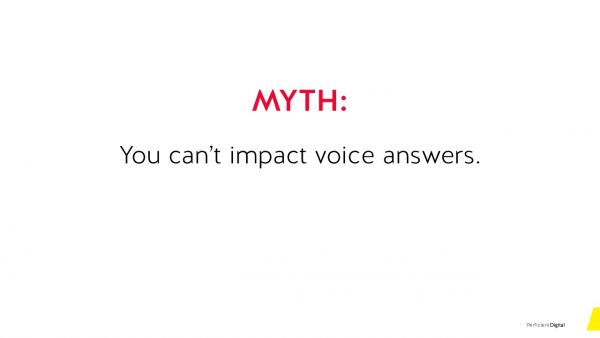
What’s the reality?
Rand: The reality here is that voice answers actually make up a very small percentage of search right now. Most of the time when you hear statistics, they are about voice search, right? There was this statistic, I can’t remember who published it, that made a lot of people fearful that by 2020, half of all searches will be voice-driven.
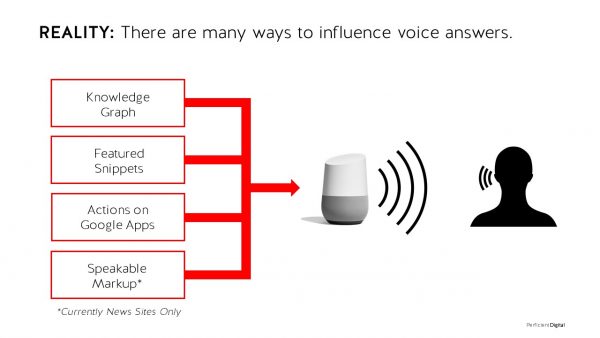
But a voice query doesn’t change what the screen of results looks like, right? We couldn’t find a single instance in which results were changed by a voice query versus a typed query. Voice answers that come from Google Home devices, Google Assistant, Siri or Alexa, are a different matter. Those answers come from somewhere, and that somewhere is often the featured snippet, an app that’s connected to Google. Brittany Mueller had some examples of apps that were connected to Google services, where Google gets the answer and you can get into it if you want to create an app like that. Knowledge Graph and other forms of schema markup are sometimes used by Google as well.
Eric: By the way, that person who made that quote was Andrew Ng, who was chief scientist at Baidu. I have a tremendous amount of respect for him and took a machine learning course at Stanford taught by him. He’s really smart, but he was off the mark on this particular one. I mean, honestly, we’re in the fraction of a percent range, in terms of actual voice searches and then there’s…
Rand: Voice answers.
Eric: Well, in terms of the queries going into a search engine, I’ve got to say that it’s roughly in the range of 1% or less.
Rand: Wow. Okay.
Eric: That’s my working estimate for that. But in reality, it’s a growing area and we’ve actually been working on voice apps for people for a couple of years now. There are a lot of people getting good results from it, and you kind of have to make sure that it matches up with your target audience. That’s a little bit off-topic but, back to the point, you can actually influence this in a dramatic way.
All right, let’s take a look at our next myth. This myth is that Google wants non-commercial content and you can’t get conversions from that.
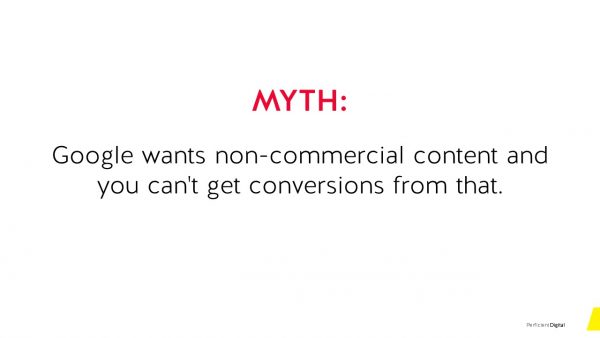
Let’s look at the reality, based on actual data published a while ago by Conductor.
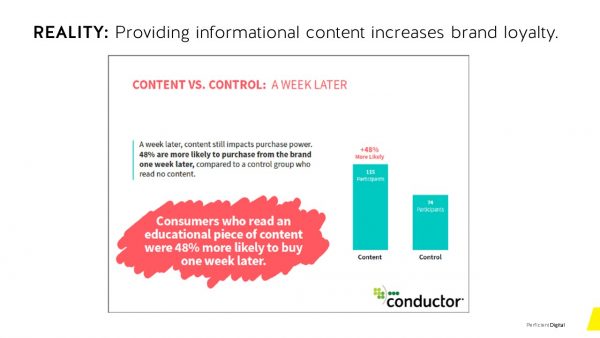
They did an excellent study on content and content marketing. What they showed was that you can get a significant lift in terms of relationship and the brand value perception with your customers by getting them or prospects to serve them informational content that helps them. In fact, weeks later, their proclivity to buy has been materially impacted. That’s one sort of slice at this. We also have lots of case studies that show publishing lots of informational content bring people to your site. They may convert at a lower rate, but there’s still a conversion rate.
Rand: Absolutely. And I’ve seen that informational content is essentially how Moz was built. It became a $50 to $60 million a year company because it provided a ton of informational content. What we saw at Moz was that an average customer bought a Pro subscription from us after seven to ten visits. The more they visited the website before they actually signed up, the more they stayed with the product, and the longer their subscription lasted. This meant Moz got more lifetime value from them. As a result, our marketing was very centered on bringing them back again and again. Eventually when they convert, whether it’s twenty or fifty visits in the future, they’re going to be very happy, long-term customers of ours. There’s a beautiful synergy between informational content creation and content that helps people remember your brand and have a positive association with it. What it offers is lifetime value.
Eric: As you know, we did the same thing with our company and are continuing to do it now that we’re part of Proficient Digital. Just publishing research, getting out there, and sharing content and information really helps to build your reputation and visibility. And here’s a fun observation. I’m constantly getting asked, “Well, that’s great for B2C, but what about B2B?” It’s working better in B2B. The informational content approach and sharing is actually huge in the B2B space.
Rand: I completely agree. I’ve seen a lot of this in the B2C and B2B space too. Something we talked about earlier, the zero-click types of searches, relates to this as well. Sometimes when your content comes up in Google, there is this impression that no one will remember and won’t have any brand association with you. There have been several studies, one by Bing, which basically shows that when a website’s domain name shows up more in the search results, people remember it more and they start to click on it more. It’s natural human psychology – the more you see something, the more you have an association with it, and the more likely you are to have a positive association with it.
This is why political campaigns put up yard signs. If they have the candidate’s name displayed on a bunch of yards, people will drive by and remember him. Then, on Election Day, they’ll check that box for the candidate. The same principle works in content marketing. If your brand is visible again and again and again, people start to have a positive association, they start to remember you, they start to have trust in you. They assume that you’re big and important and that Google thinks highly of you. Therefore, you must be a reasonably good website.
Eric: There was that old marketing saying, seven impressions to a sale.
Rand: That’s almost exactly what Moz’s visits were on average before the Pro sign up. I’ll tell you what it is for SparkToro once the product is live. It wouldn’t surprise me if it’s similar.
Eric: It wouldn’t surprise me either. All right, let’s take a look at our next myth, that social is bigger than search.
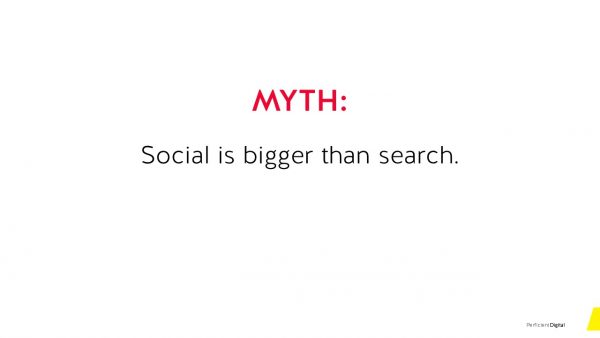
Rand: So I basically asked the folks at Jumpshot, “Hey, can you give me referral data on the top?” I asked for the top 5,000 websites.
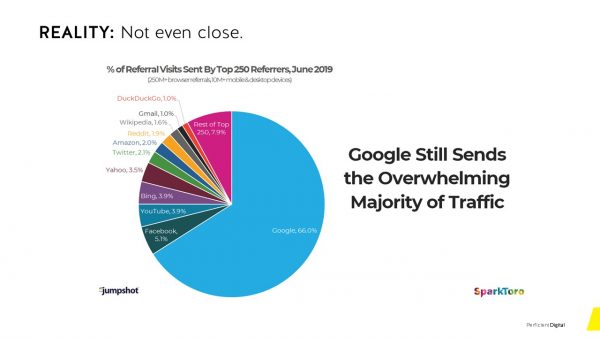
They basically looked at all the traffic that flows to them, anything that’s within an attributable source and where it comes from. You can see pretty clearly that Google is sending the overwhelming majority of traffic. And Facebook, which is number two and a tenth of the size, is tiny in comparison. Google is also responsible for YouTube. The long tail is bigger than any one of the single smaller ones, so the rest of the top 250 is bigger than Facebook, Wikipedia or Bing.
I think what’s slightly concerning here, at least to me, is what a stranglehold Google has over the webs ecosystem. Essentially what Google does affects everyone and everything. However, if you are hearing from your boss, your team, or your clients, “Hey, we’re not investing enough in social. Social should be sending more traffic. Why aren’t we doing as well there?” The reality is that, for most large websites, Google is sending the overwhelming majority of all traffic, not just search traffic.
Eric: Yes. And it’s interesting because I think for most businesses, Google is critical. There are a few businesses I’ve run into over the years in which social was basically the way they built their business. It can work pretty well. In some market sectors, such as entertainment-centric ones, and other kinds of businesses where social connectivity is a big deal, this works.
Rand: Politics is another sphere where this is absolutely the case. I’ve seen it in literature and writing as well where, for fiction and even nonfiction, social is 50 percent plus.
Eric: Yes, but for 90%+ of the businesses, it’s basically Google. For that 90 percent, social is not the best source of traffic. It’s probably not even good at converting traffic when you get it.
Rand: The way I think about social in a lot of those cases is, how do I get exposure to the audience? That’s how I get people to know me, to like me, to remember me. My goal on social is to be seen to get engagement rather than to drive clicks. And this is because Twitter, Facebook, LinkedIn, Instagram, Pinterest, Reddit, you name it, whatever the social platform is, they’re intentionally biasing not to drive traffic out. I’ve done this experiment on Twitter many times, looked at a bunch of data around this. You can see that a tweet receives X many impressions, X many engagements. That includes comments, replies, retweets, likes, etc. If there is a URL in it, Twitter will intentionally make it a little less visible, sometimes a lot less visible, than the same tweet that does not contain a URL and gets the same amount of engagement.
You can test the same thing on Instagram. There was a great experiment in which a team of folks in the influencer marketing space put the text “Link in bio,” right on their Instagram posts. Then they had the same posts without it and saw that those posts didn’t have as much engagement. Hard to say. But there you go. LinkedIn, the same thing. LinkedIn is pushing shares containing a URL down. That’s why so many folks have gone to a system of seeing the first comment for the link and then commenting on their own posts to try and drive you to the website. In all of these cases, the clear reality of social is that it’s a great place to drive engagement, to gain brand awareness, and then later use that brand awareness. You can basically benefit from that when people see you in search, when they come directly to your website, when they think, “What was that site? Who was that person with that great content I saw via LinkedIn, Twitter, Reddit, Facebook, Instagram, whatever.”
Eric: Absolutely. And our next myth was actually highly related to that one, or at the very least, interacts with it.
And that is the idea that Google and Facebook are dominant. I mean, if I have a social business that’s socially-centric, maybe I should just spend all my time on Facebook. And if I’m otherwise spending all my time on Google, those are the only places I should market.
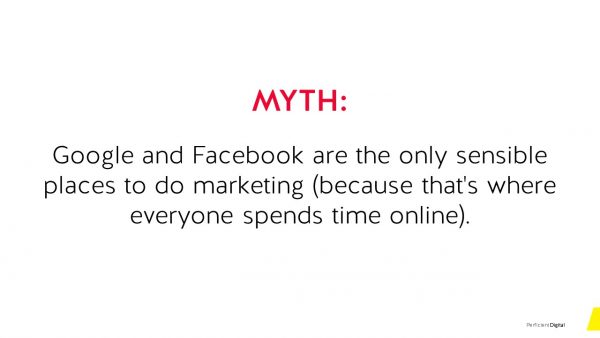
Now let’s look at the reality.
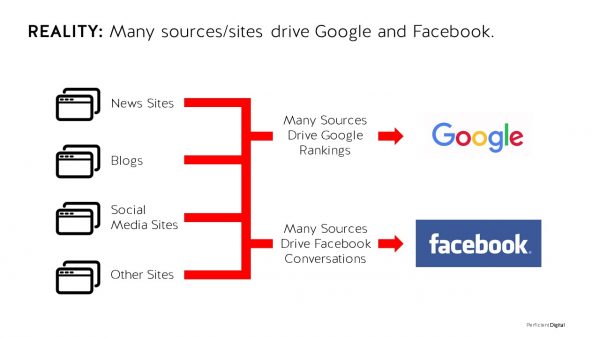
Rand: This is, no surprise. But Google and Facebook are influenced by what happens on the rest of the web. Google doesn’t rank things based on some arbitrary criteria. They rank things based on the engagement and the links and the mentions what’s getting talked about, even what is getting searched for right now. One of the trending searches two days ago was on 30 to 50 feral hogs. Why was that trending? Why was that such an incredibly popular search? Because one person sent a tweet reply to one other person. This was in relation to the gun control debate, saying, “What am I gonna do when 30 to 50 feral hogs attack my children every three to five minutes in my backyard. You know, I need a big weapon that can shoot them very quickly.”
Anyway, lots of people were having fun with that on Twitter and it became an internet-wide phenomenon. It was all over Reddit and then tons of people were searching Google and of course, Buzzfeed was producing articles about it. I think “The New Yorke,” was making fun of it. So, as all this content was being created, Google recognized that people were searching; hence, you have this stream of influence. I think that is very wise for marketers to pay attention to. How do I influence Google and Facebook? These, the primary drivers. Oh, it’s through everything else, right? This is the contention behind SparkToro. We essentially exist because we think people want to and need to influence their audience in all the places they go before they get to search, before they get to a purchase-ready advertisement. I think that’s a smart place to play in content marketing, social media marketing, influencer marketing and email marketing across the board.
Eric: Yes, there’s no question that the overall environment has a tremendous amount of interaction and, in spite of what people think, there is a certain amount of pressure on platforms like Google and Facebook to provide an outstanding experience for their users because that’s how they preserve market share. And how do they figure that out? They find out that something is trending and people are really interested in it. And in the particular case of the feral hogs, the issue there is that people will start searching on that. And if Google doesn’t have an answer, this will create dissatisfaction. That’s the reason why platforms are wired to pick up these signals and are able to respond to them as quickly as they can.
Rand: Absolutely right.
Eric: One more myth that we want to talk about is that paid search is too expensive for you to make a positive ROI.
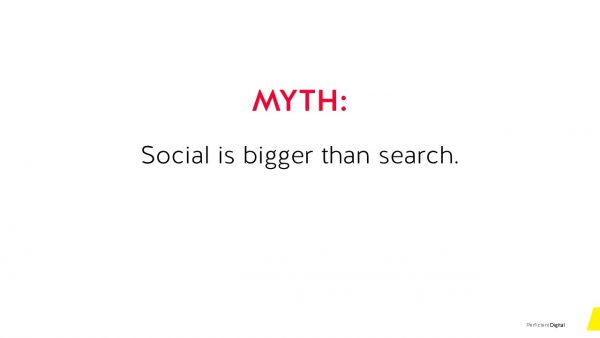
All right, let’s look at the reality of this one.
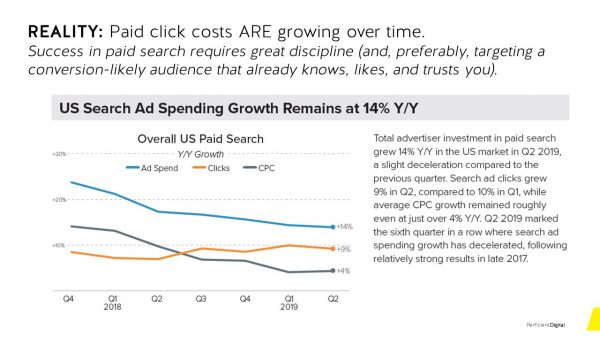
There’s no question that when you have a direct response marketplace, there is a tendency for ROI to ask for zero because more and more people will pour money and they’re willing to take lower and lower margins just to get the customers in. In these situations, you need to do a couple of things. You probably need to be better than average in how you optimize, or you need to put a lot of effort into effective optimization in order to be successful. That’s actually a really important thing to understand. But people who know how to do this well actually do make money from paid search. It’s just a big investment. It’s not like the “set it and forget it” thing. It’s constant ongoing work. The other thing is, how do you set up your business insight to be able to extract a lifetime value from those customers? Maybe that’s where a lot of the ROI comes from. That turns into a very effective initial customer acquisition—maybe at low margin—but with good profitable margin activity over a longer period of time.
Rand: Totally agree. I think there are two issues that I had mentioned here. One is to your point around people’s spending until it becomes unprofitable. There’s also this issue of tons of money floating around the venture and private equity marketplace right now. And those are dollars seeking growth, not profits. And because of that, there are a lot of areas where you look at paid search and you think, how can my competitors possibly afford this? How can they be making money on this? They are not. They are losing money on every sale. Think Uber. Uber loses a bunch of money on every ride you take with them. And the hope is that long-term, through a bunch of improvements and efficiencies, essentially they’ll get self-driving cars, replace the drivers and then make money. But they’re losing money on every single one.
That is happening in a bunch of markets and that becomes a big challenge. The way to overcome this in those competitive marketplaces is to bring people in via organic, capture their email address, their cookie. Get them to your website and then remarket and retarget through things such as RLSA, personalized advertising, uploading an email database to Facebook, Google, Twitter, LinkedIn. Then play to people who already know you, like you, trust you.
Eric: Absolutely. Clearly, retargeting or remarketing is a very effective platform. And drawing on other aspects, pixeling your site or doing things where you can actually tap into those ways of getting their ROI on things.
Rand: And that’s getting harder, because of all the privacy changes that browsers are making them do. But it is still absolutely possible, especially if you can capture an email. I love organic to capture an email, and paid to convert that email into a buyer.
Eric: Absolutely. All right. You ready to handle some questions, Rand?
Rand: Let’s do it.
Eric: John Berniers says, “There seems to be a correlation between dropping my AdWords budget and drops in organic ranking. Truth or myth?”
Rand: I think there is truth in the correlation. I don’t think it’s causal. So what I’ve seen very, very often when I looked at a business, during my SEO career, they’d say, “Hey, we pulled back on our paid spending and we’re seeing drops in organic paid spending.” Usually, they’ve dropped paid spending across a bunch of vectors, not just some of their prices or bids in SCM. And because of that pulling back on marketing efforts, they’re branding fewer people. Fewer people are looking for their brand name because they didn’t come to the site via paid search and type in their brand name later. There’s this strong correlation between paid traffic and organic traffic that doesn’t necessarily mean Google is dropping rankings because you’ve stopped paying them. It means that your brand is doing less engagement on the paid side. Those engagements of all kinds are driving fewer links, fewer mentions, fewer brand searches, fewer clicks per search, a lower click-through rate in the organic rankings, more people biasing to your competitors. And as a result, your rankings and your traffic start to dip.
Eric: And then you go back to the “11 impressions to a sales” kind of thing. To show up twice in the results rather than once. There is some data, not in all cases, that suggests increases in total clicks between the two positions. So there’s value to that. Can you imagine if the European Union got a hold of and could prove that Google was using paid search to influence SEO?
Rand: So I want to be clear. It’s hard for me to imagine that there aren’t some crossovers, but the organic team at Google is so religious in their thinking about how pure their environment should be. How, unaffected by the paid world, I think that those engineers would all stand up and walk out if they thought that their leadership team was nudging them to include paid signals in the organic rankings. That being said, it doesn’t matter whether Google is using it directly or not. The reality is exactly what you said, John, which is that there’s a correlation, a connection. It’s quite clear and we should all be aware of that. When you stop spending on brand, on paid, on PPC, you will also usually appear to be less inorganic.
Eric: We could get into the whole correlation versus causation discussion.
Rand: I mean, it’s causal. It’s just not part of the algorithm, right?
Eric: Right.
Rand: This next question is from John. Does getting the right kind of clicks matter more than high ranking?
Eric: I alluded to this earlier. Situations where we don’t get clicks in many cases in Google are not bad because the clicks wouldn’t have had a lot of value anyway. Look, at the end of the day, I do think it makes sense to strive to get ranking on the right kinds of things that deliver the right kinds of clicks. But you do have to look at that holistically. You do run into situations, where it’s going to take multiple visits to your site before you get a conversion or to get a property under your control before you gain a conversion. And some of those are going to come in on informational queries with a fairly low percentage chance of converting. Over time, they’ll work their way to getting the right kinds of clicks and rankings. That’s kind of how I see this one.
Rand: I agree with that. I would also say in answer to the right kinds of clicks versus the high rankings, I think it really does pay to consider what words, phrases, and content are most valuable for you to go after from both a branding perspective and a direct conversion perspective. I want people to associate my brand positively with the words and phrases in this realm. And on the direct conversion side, the keyword sorting further down the funnel. I worry when people put so much conversion-heavy focus on their SEO that they miss the top of the funnel. When you put too much focus on the bottom of the funnel, the very end before someone converts, you’re usually losing out on a ton of value that’s created up in the higher echelons of the funnel, in the earlier stages of the buying cycle. And your competitors are taking those away from you, which can cause you to lose a lot of value.
Eric: It’s like drying the pond of your future potential customers.
Rand: Exactly. The next question is from Stephanie.
Eric: The question is, “With the drop in organic clicks, how can a site win with search? ”
Rand: I talked about this a little last month. I think the key here is to say in aggregate there are fewer organic searches, fewer organic clicks per search or per 100 searches. However, Google has grown in the number of searches performed. There are more searches done today than there were three years ago, and they are on more types of devices. There’s desktop, mobile, a mobile app. And there are more people searching, especially globally. In the US, we’ve reached a relative plateau, but around the rest of the world, huge numbers of people are still coming online, are still starting to use Google. As a result, there are more organic clicks in total available in 2019 than there were in 2016. In looking at the data across the board, essentially searches have grown, and paid and zero-click searches have cannibalized organic.
There’s still a tremendous amount of opportunity, probably more opportunity than there’s ever been in Google. I would not be too worried about that. You know those statistics. In certain fields, such as lyrics, travel, and weather, Google has definitely cannibalized a ton of it and there’s less opportunity than there was in the past. But the keys are playing content, social, news and PR Games, getting people to recognize your brand, getting value from zero-click searches. If you can influence people through the zero-click search, and you don’t need to be able to prove value to your client via purely visit-based metrics, you can prove it like this: say you have a ton of impressions on a search query where you have the featured snippet at the top that tells people this answer. They’re going to remember you and come to you. The result is, you can win a lot through those zero-click searches.
Eric: Another thing to remember. Even if Google takes the major traffic to themselves, they don’t tend to cover the long tail side of things. So there remain opportunities to play even in those spaces. Maybe over time that will erode too, but for now there’s still a lot of hay to be made there.
Rand: Absolutely.
Eric: All right.
Rand: So Janet is asking, “Is blog creation enough to drive all of our SEO or do we also need to regularly update the rest of our websites’ pages as well?”
Eric: So I’ll start with the blog piece first. I believe most of the people who publish their content on a blog shouldn’t be using a blog as the format for that content anyway.
Rand: I agree. And I’m a blogger.
Eric: Because if you’re publishing evergreen content in volume, you have certain flaws in a blog structure. Content ages artificially and it’s not under your control. And the percentage of pages that are not useful for Google to index is disproportionately high. A content hub structure is a much better way to do that. You need to look at what you should be doing at your other website pages as well. That isn’t necessarily just about updating the existing pages. There’s definitely room to think about that, but as Google gets more and more centered around rewarding the sites that have the best breadth and depth of content, you need to think about this; not just your informational content, but the other content that will send Google strong signals that you will satisfy a large percentage of your site users. This is more complex than just throwing up pages for the highest volume search terms. You have to be addressing a lot of the chunky, middle and longer tail terms in order to satisfy a large percentage of users.
Rand: Absolutely.
Eric: The next question is from Mary Grace Wilson. “What’s your opinion on the importance of citations?”
Rand: I am a stronger believer in the value of citations. I think that Google is looking at the web, especially trusted portions of the web. Things that appear in news sites, reference sites and domains where Google has high confidence that the information has been editorially reviewed, and that the publisher themselves is consistently accurate and truthful. Then they look at mentions of brand names, like any other entity, and connect those up with other words and phrases to form semantic sort of understandings of the connections between those words and those brands. Over time, that can have a huge impact in how you rank around a massive number of terms and phrases related to what your company and your brand does.
You can see this in some sectors where a brand and a website never really mention who they are, never mention what they do. They are completely unoptimized from a keyword level SEO perspective. And yet because other people on the web reference them so much when they talk about something, you’ll see that they come up. A good example is one of the consistently highest-rated restaurants in the world, a place called Osteria Francescana. It is in Italy. It’s near Bologna. It’s in Modena and it’s run by this guy, Massimo Bottura. And you can see there’s a Netflix “Chef’s table” special all about this place. He goes to this restaurant once and there’s all this content around it.
He never mentions the restaurant itself; there’s not even the word “world’s” or “best” or “restaurant” on the page. It’s in Italian, right? But they come up all the time for “world’s best restaurant” in Google because everybody else, whenever they talk about this place, even if they don’t link to the website, mentions Massimo and Osteria Francescana. There you go. It’s these semantic connections that are forming. And so, I’m a big believer that if you can get your brand and your name sited in places that are reputable, high quality, trustworthy in a consistent fashion, you will start to rank for those terms and phrases that people associate your brand with.
Eric: Yeah. And even if it isn’t a direct ranking factor, I think we agree that there’s a causal relationship because it’s the overall holistic behavior of the web, which the citations feed into.
Rand: Yeah. that search query, by the way, for “world’s best restaurant,” it has a fascinating thing. Google pulls up one of those scrolling info boxes and the first three are Eleven Madison Park, El Celler de Can Roca, and Osteria Francescana and then El Bulli right in Spain. But I find that fascinating because it’s not in the regular organic results, but Google has basically said they recognize that this brand is often cited in places where world’s best restaurants are talked about.
Eric: Well there you go. Hey Rand, looks like we’re kind of at the end of our time here. Amazing as always to talk to you. Thank you so much for joining us today.
Rand: My pleasure. It was really fun. I love busting myths with you. I hope we can do it again sometime soon.
Eric: We’ll work on setting it up sometimes. I appreciate it very much. To all of those who have watched, thank you so much for watching. I hope you’ve enjoyed the event today and we hope to be back with you sometime soon.
Rand: All right. Take care, Eric.

